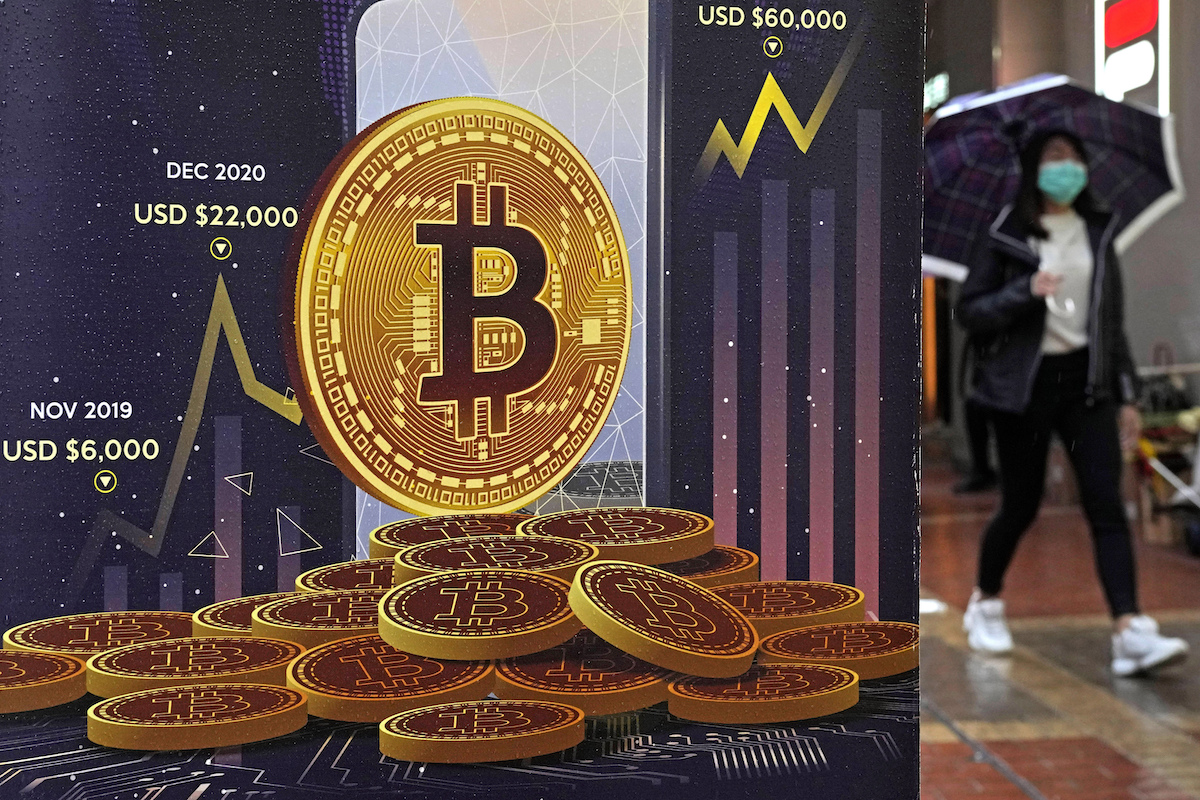For those who’ve heard the word a lot but are still not sure what it means, cryptocurrency is a digital asset used to make purchases. It operates using a computer network, often a blockchain, a shared ledger that acts as a mechanism to transfer value from one person to another and that records and stores information in chains of “blocks”—chronological groups rather than tables or folders like more traditional databases. This provides a digital way to move money using the internet, and operates as a decentralized mediator through “mining,” which ensures that both sides of the transaction are validated. When engaging in any exchange, we must ensure that the person who promises to pay does pay and the person who is owed payment receives it. It’s this process that keeps the transactions honest, and mining is the process of updating this ledger, which exists in many places at the same time, providing transparency. The miners are rewarded for authenticating the transactions, and this encourages virtuous behavior. There is an excellent, more detailed discussion of this process here.
Any time we use a currency to transact, we must trust both the currency itself and the issuer of the currency. In ancient trade, this was difficult. For example, in European markets, people brought coins from different countries, so a system of adjudicating weights and measures in currency was essential for the trade to take place. Modern government-backed currencies attempt to generate trust through central banking policy, which is at least superficially intended to ensure that money supply meets money demand. Absent commodity-backing, these currencies are only as trustworthy and sound as their governments.
Obviously, central banks vary in their trustworthiness. Venezuela destroyed its economy first by nationalizing oil and later by using the printing of currency to finance government spending. This destroyed the purchasing power of the currency along with income and wealth. Some of the worst episodes of inflation include post–World War II Hungary, Germany in 1923, Yugoslavia during its 1989 breakup, and Zimbabwe in the early 21st century. In short, the economic freedom of a country includes measures of the soundness of the currency. Money is important as a medium of exchange, but the government requires the proper incentives to maintain the soundness of the currency. Unexpected inflation and, far worse, hyperinflation destroy the foundations of entrepreneurship and exchange.
Cryptocurrencies provide a potential alternative to business as usual in that they’re decentralized and operate outside the boundaries of any national government. They potentially provide insurance against poor decisions in monetary policy, which results in fiat-based (government-decreed) currency inflation, because they provide an alternative medium of exchange. Rising levels of overall inflation, as the U.S. is now experiencing, will affect the purchase of all goods and services, but cryptocurrencies cannot be inflated by government edict. They also operate on network effects, just like traditional currencies, meaning they only become valuable as a medium of exchange if enough people desire to hold them and use them.
Bitcoin is the most widely used and identifiable cryptocurrency right now, with a total market cap of $835 billion, more than double its closest rival, Ethereum. In striking comparison, the Russian ruble has a total market cap of $626 billion. The Russian ruble today is worth less than one penny on the U.S. dollar, and as Putin pursues his war in Ukraine and as Russian oil markets crash, we can expect the Russian ruble to maintain that low value.
There is a fixed supply of 21 million bitcoins, but the total quantity won’t be released until sometime in the next century, which means the supply curve is vertical at any given point in time. Every 10 minutes a new bitcoin enters the system, and as cryptocurrency expert and economist Will Luther explains, Bitcoin is created by adding a block of transactions to the blockchain. This fixed supply of bitcoins is encoded in its source code and cannot ever be changed, which is key to its value—it’s difficult to increase supply and there’s no single authority. However, because the supply curve is fixed at any moment, changes in demand must be met entirely by changes in the price of Bitcoin.
In a formal banking system, trust emerges through institutions that safeguard the exchanges of currency. With cryptocurrency, this happens outside any central authority. Cryptocurrency has no third party that validates the exchange, like a bank, so the trust emerges through the process of updating the ledger. As the ledger is updated, everyone can see it, reducing fraud by safeguarding incentives for accurate mining. What cryptocurrency cannot do is offer a supply mechanism that expands and contracts to offset supply and demand, like gold or precious metals in traditional currencies. Yet the digital nature of the currencies allows for instant transactions, providing a decentralized workaround for people who are the victims of central banks run amok.
The total market cap of all cryptocurrencies is $2 trillion, and there are more than 16,000 cryptocurrencies in circulation. The trading volume of all cryptocurrencies per 24 hours is $75 billion. Three of the top cryptocurrencies are directly pegged to the U.S. dollar—Tether, USD Coin, and Binance. When cryptocurrencies tie themselves to another government-backed currency, they will by default adopt government inflation rates. Some cryptocurrencies are tied to commodities such as precious metals, oil, and real estate. This could present a market for competing currency pegs whereby consumers adopt different cryptocurrencies based on their needs and preferences, and this competition would add to the discovery process around the best pegs and best practices.
Purchasing cryptocurrency is quite simple, and there are a variety of cryptocurrency exchanges, such as Coinbase, Gemini and Binance, dedicated to helping you purchase it with a few simple clicks. While the process is simple, it’s not easy, as one Bitcoin will set you back almost $46,000. However, there are many cryptocurrencies from which to choose and countless blogs and articles that walk you through the process. The first step is to create an account and transfer funds into it; then you’re ready to buy. Once your purchase is complete, you’ll need to determine how to store the currency; you can create an online wallet or transfer it offline. Online wallets present some risk, however. They’re not insured by the Federal Deposit Insurance Corporation (FDIC) and are vulnerable to hacking. In fact, if you forget or lose the password to your account, you can lose all your investment, as has happened with millions of dollars of Bitcoin.
Once you own cryptocurrency, you can hold it and sell later or use it to make purchases. Bitcoin and other cryptocurrencies offer debit cards and can be used at ATMs to withdraw cash. Some cryptocurrencies allow you to convert your cryptocurrency into a gift card; some retailers accept cryptocurrencies directly. There are benefits to using a cryptocurrency for purchases, in that it doesn’t incur banking fees. Additionally, it offers low transaction fees for international transfers and can be accessed by those in emerging markets who are “unbanked.” Bitcoin transactions are secure, mobile, and irreversible; they cannot be amended by a third party.
Approximately 8% of the U.S. population currently trades in cryptocurrency, but as a continent, Asia has over four times more cryptocurrency users than any other. Cryptocurrency is an attractive option but depends on regional or country differences in monetary policy, government stability, and conditions of commerce. In Venezuela, a country suffering from hyperinflation, sanctions, and a devasted economy, cryptocurrency provides a hedge against inflation. Chainalysis reports that Venezuela ranks third in the Geographic Crypto Usage Index. One of the more important features reported is that Venezuelans desire a platform that can’t be monitored by the government. This is not unique to Venezuela, as cryptocurrencies can be very important in emerging markets, and global adoption rates increased 880% last year. Just this week, a Russian official proposed allowing friendly countries to pay for oil and gas in crypto.
One of the risks of holding cryptocurrency is its volatility, which can affect the stability of its purchasing power. It’s also elusive to regulation, although that doesn’t deter regulators from trying. Critical to the success of any cryptocurrency is trust. If Bitcoin decides to scrap its hard cap of 21 million coins, this will alter its value and dissuade people from holding and using it. It’s all about the incentives. And if a cryptocurrency company doesn’t face strong internal incentives to maintain its commitment to the fixed supply, pump-and-dump schemes could allow for fraud and even greater volatility. This is where the network effects come in—the more widespread the use and acceptance of a cryptocurrency, the greater the incentives to maintain credible commitments and keep the value strong, in this case by limiting the supply through hard caps.
Why then has Bitcoin been so volatile? First, it’s still in its infancy, so this type of volatility is to be expected, as it has no central bank backing its value. In some ways, the early volatility is part of the benefit that comes from its decentralized nature. Central banks can smooth currency volatility, but they can also destroy a currency.
Additionally, the value of Bitcoin or any cryptocurrency is affected by outside factors. Last year, China announced a crackdown on banks completing cryptocurrency transactions; around the same time, Tesla announced it would no longer accept cryptocurrency as payment. These factors directly affected crypto’s windfall losses in the spring of 2021, with Bitcoin losing 30% and Ether losing 40% in only 24 hours.
What about the future? Governments don’t want to lose out on opportunities either to regulate or to be in the cryptocurrency business themselves. Thus, none of the behavior of the Chinese government is surprising, which includes banning cryptocurrencies and launching one of their own. President Biden issued an executive order to research the possibility of a central bank–issued digital currency and to pursue regulations on existing cryptocurrencies. Not only are concerns about government mismanagement and the regulating of cryptocurrencies valid; there are privacy issues to be considered. One can imagine the federal government banning the use of cryptocurrency in the sale of cigarettes, sugary drinks, non-woke books—the list goes on. Moreover, when people adopt crypto as a medium of exchange, the government loses out on its source of revenue over base money creation, thus they have powerful incentives to regulate the competition to preserve its monopoly. We should expect from government-owned digital currencies exactly what we get from national physical currencies—centralized fiat money, i.e., backed only by government decree, but in digital form.
Crypto is not without its own problems. For example, it can be used for nefarious purposes. After Visa and Mastercard denied Pornhub use of their services, the only form of payment now accepted is cryptocurrency. This makes it much more difficult to crack down on specific accusations against Pornhub, which include: rape of adults and children, sex trafficking, and child pornography. Empirical analysis reveals that deplatforming Pornhub increased the value of Bitcoin by 45%. While this is not cause to outlaw cryptocurrencies, it does reveal problems when used for illegal activities.
On the plus side, however, there’s this: When Ukrainian politician Mykhailo Fedorov’s called for “all crypto exchanges to block addresses of Russian users,” it was met with polite declines from several crypto-exchange founders, including Elon Musk. This is a principled commitment to commerce that reflects an unwillingness to use crypto as a political tool.
Yes, the future of cryptocurrency remains unknown, but there are good reasons to be optimistic about its role as a decentralized medium of exchange, while remaining aware of its limitations and the troubling uses to which it can always be put.
I am grateful to Dr. Bryan Cutsinger for helpful comments and insight on earlier versions of this draft.

